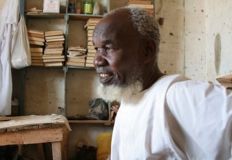UN envoy faces opposition in heartland of Darfur rebel leader
December 8, 2007 (HASSA HASSA) — The U.N. special envoy for Darfur faced a firm opposition during a tour in the tribal heartland of the region’s top rebel on Saturday. The UN official was trying to draw the reluctant chief’s followers into new peace talks that have stalled since October.
 Jan Eliasson’s effort faced firm opposition by local Fur tribesmen, hardened by what they describe as years of persecution at the hands of the Sudanese government.
Jan Eliasson’s effort faced firm opposition by local Fur tribesmen, hardened by what they describe as years of persecution at the hands of the Sudanese government.
Most Fur tribal chiefs follow rebel leader Abdelwahid al-Nur, who is boycotting the U.N.-brokered peace talks until a planned U.N.-African Union peacekeeping force of 26,000 deploys in the region and proves effective in ending the bloodshed.
Among those skeptical of peace talks was al-Nur’s elderly father.
“Tell my son we are proud of him, that he must continue the fight because we are dying,” Mohamed Ahmed al-Nur told The Associated Press.
Peace negotiations were launched by Eliasson in October, but broke off just after opening in Libya because of the absence of major rebel chiefs.
Abdulwahid al-Nur, who lives in exile in Paris, is the founder of the Sudan Liberation Movement/Army. He yields little military power, but enjoys widespread following among his tribe, the Fur, which is Darfur’s largest and gave the region its name.
A black African tribe, the Fur have been among the main victims of the ongoing conflict that has killed more than 200,000 people and chased 2,5 million from their homes — mostly ethnic African civilians — since Darfur rebels took arms in 2003 against Sudan’s Arab-dominated central government, accusing it of discrimination.
A previous Darfur peace deal signed in May 2006 has largely failed, in part because al-Nur refused to endorse it. Eliasson was keen Saturday to win the Fur civilian leadership to the idea of new negotiations.
“We want to begin the political talks and deploy the peacekeepers at the same time,” Eliasson told a tribal gathering in the Hissa Hissa camp, home to some 50,000 Fur refugees. “We hope these two processes will reinforce each other.”
Although Eliasson aims to open “substantial negotiations” in early 2008, U.N. Secretary General Ban Ki-Moon warned this week that the Darfur peacekeeping force due in January faces considerable delays because of Sudanese government foot-dragging and a lack of equipment and troop commitments from wealthy Western nations.
Eliasson hopes countries wary of sending troops would be reassured if a political settlement is under way. “We would like to offer you a voice in this process,” he urged the tribal leaders. “You carry a trauma, but I hope you will also look at the future.”
Leaders in the camp, which lies next to al-Nur’s hometown of Zalingei, read out to Eliasson a long list of their conditions, which echoed those of their chief.
U.N. peacekeepers must deploy urgently, they said, to disarm government paramilitary groups and expel new Arab settlers squatting the Fur refugees’ empty villages. Only then can the U.N. effectively monitor a peace deal, they said, and also called for compensation for lost relatives and destroyed lands.
Al-Nur’s father, whose clan was influential in politics before Sudanese President Omar al-Bashir seized power in 1989, had stayed back in his dusty shop in Zalingei and did not meet with the U.N. envoy. Of his 20 children, he said, most of the sons had joined their brother’s rebellion.
“We welcome Eliasson and we want nothing more than peace,” the elder Al-Nur said. “But without international force, there is no way we can trust this government.”
Khartoum denies it backs the janjaweed militia of Arab nomads blamed for the worst atrocities here, but the International Criminal Court has jointly charged a Sudanese minister and a janjaweed chief with crimes against humanity.
The U.N. estimates that over 4 million people — two thirds of Darfur’s population — are now seriously affected by the conflict. With the spread of chaos, some of the Darfur Arabs have now also fled to refugee camps, where Eliasson came to meet them near Zalingei.
Distrust prevails and most Fur say they view the 17,000 new refugees from the small Al-Hutiya tribe as also being janjaweed. But the Al-Hutiya’s camp chief, Idriss Ibrahim, denied this.
“We’re Arabs, but we have nothing to do with the janjaweed,” Ibrahim told the AP. “That’s why the government didn’t give us weapons and we are now refugees,” he said, pleading with Eliasson that his tribe be represented separately in the peace talks.
“I know you are also the victims of this terrible conflict,” Eliasson said, stressing “nobody must be forgotten” when talks eventually resume.
(AP)

kalydosos
UN envoy faces opposition in heartland of Darfur rebel leader
There must be something of value that the international community should realise when dealing with the issues of war and peace in Sudan. For about a year now, the interantional community is trying to conveince the people of Darfur to accept a shaky deal and Abdul wahid Mohamed Nour is the only odd voice calling for what has turned to be a challenge and a justified reason for Nour rejection of any settlement to the conflict in the troubled region. It is deemed important to settle on the issue of civilian security through the depolyment of an AU-UN force. Both the Government of Sudan and Abdul Wahid Nour know the secret of hwy the former is reluctant to deploy these forces and the later is reluctant to join any peace talks if these forces are not deployed. The people of Darfur are seriously affected by an imposed peace. When will the international community put into consideration the voice of the masses who are in all cases voiceless.
International Aurora
Good Darfur-news analysis
This website has real analysis of the news from Sudan. Feel free to help it be better.